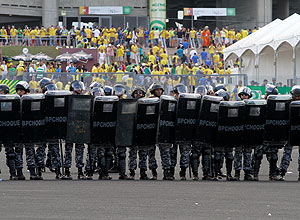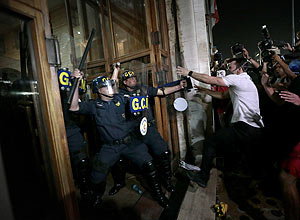Latest Photo Galleries
Brazilian Markets
17h29 Bovespa |
+0,95% | 127.122 |
16h43 Gold |
0,00% | 117 |
17h00 Dollar |
-1,52% | 5,1126 |
16h30 Euro |
+0,49% | 2,65250 |
ADVERTISING
Journalism Leads Social Media Sharing in Brazilian Protests
07/12/2013 - 08h41
Advertising
MARCELO SOARES
NELSON DE SÁ
DE SÃO PAULO
News produced by Brazilian newspapers, portals and TV channels were the ones most shared on social network sites during the protests that swept the nation in June.
From June 6 to 22, Brazilian media links on the internet accounted for 80% while using the most important hashtags related to demonstrations on Twitter, according to data from the site Topsy. Only 5% of these links came from blog posts.
On Facebook, even when it is not possible to analyze the nature of the links, the press also multiplied its reach. Survey from the SocialBakers site shows that the number of people commenting and sharing news coming from Brazilian papers tripled in this period.
This is exactly what happened with Folha 's Facebook page: from an average of 200,000 daily interactions before the protests, it jumped to nearly 600,000 interactions on the newspaper's content from June 20 to 22. With 1.7 million fans on the days of the protest the news website got more than double the visits coming from Facebook.
| Andre Borges/Folhapress |
 |
| news from newspaper and portals shared on social media tools such as Twitter and Facebook played the role of providing protesters with information, opinions and criticism. |
POWER
According to experts, news from newspaper and portals shared on social media tools such as Twitter and Facebook played the role of providing protesters with information, opinions and criticism.
Fábio Malini, coordinator of the Lab for Research on the Internet and Cyberculture from Federal University of Espírito Santo, says the survey confirms the group studies: "The [informative] power has been identified as belonging to the press." With this, users of social networking sites use the news to legitimize their claims: "The press played a strategic role."
Rosental Calmon Alves, the director of the Knight Center for Journalism in the Americas, from the University of Texas, points out the symbiosis between social media and journalism. "Despite its articulation coming from outside the traditional media, the movement is nourished by journalism. The journalism role becomes even more important as it sustains itself as verifying source, prepared to investigate and publish facts."
LEADERSHIP
The 2013 Digital Journalism report released last week by Reuters Institute, Oxford, shows that Brazilians are ahead in news sharing worldwide.
While 44% of Brazilians exchange and comment on stories via social media, only 8% of Germans and Japanese do the same. Spaniards arrive closer: 30%. Conducted by YouGov, the survey listened to 11,000 Internet users from the USA, UK, France, Denmark, Germany, Italy, Spain, Japan and Brazil. Results "suggest that the culture of a country is what defines engagement with online news," according to Nic Newman, former BBC digital strategist and coordinator of the report.
Brazilian culture "is very social" outside of social networks, says Newman, which in turn reflects the same attitude online.
DESTROYING RUMORS
The press had another role during the protests: to validate or refute misinformation disseminated by social media users
From a fake Jô Soares (a well-known TV news host) announcing two deaths in a protest, on Facebook, to the general warning about a military coup, on Twitter, rumors spread with no control in that period.
Another rumor was that President Dilma Rousseff had said the internet would be shut down if protests continue. The origin of the latter was identified as coming from humor sites.
| Fabio Braga/Folhapress |
 |
| One of the rumors said that one of the people involved in the depredation of São Paulo City Hall would be the same person who tore the ballots from jurors voting during the 2012 Carnival, Tiago Ciro Tadeu Faria. |
But the remaining rumors origins are lost in the tangle of versions that ended up getting visibility on Facebook profiles and Twitter accounts.
One of them said that one of the people involved in the depredation of São Paulo City Hall would be the same person who tore the ballots from jurors voting during the 2012 Carnival, Tiago Ciro Tadeu Faria.
In fact the perpetrator was an architecture student Pierre Ramon Alves de Oliveira, as the press revealed.
"You start peeling, peeling until you get to the source. It is like a cordless phone game: back at where it started, it was something else completely," said Leonardo Sakamoto, a journalism professor at PUC-SP University. He even posted on his blog at UOL, a Folha Group company, which publishes Folha, "The Ten Commandments for journalists on Twitter and Facebook." The first is "you should not spread news without first checking the source of information."
Translated by SIMONE PALMA



